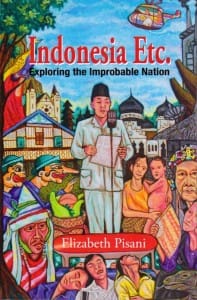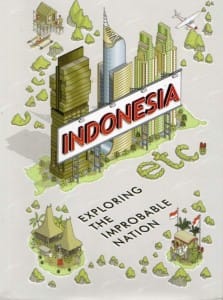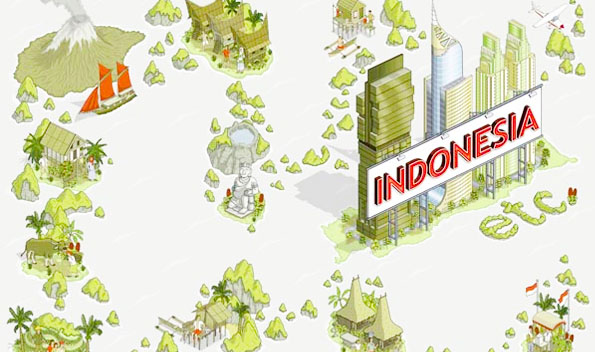
Elizabeth Pisani
Published June 2014
– In the UK by Granta / in the US by WW Norton
– In Indonesia by Godown, an imprint of Lontar (http://www.lontar.org)
I dumped my bags in a dispiriting hotel room, asked the staff to clear out the dead cockroaches and headed out to explore.
And explore Indonesia with a very keen eye and widening mind is what Elizabeth Pisani (EP) did for just over a year in 2011/12. She was first posted here by Reuters in 1988, having backpacked the banana pancake circuit of North Sumatra, Java and Bali in 1983. She left Indonesia in 1991 “following several differences of opinion with the military about the accuracy of [her] reporting, particularly around the unfolding civil war in the north-western province of Aceh.”
Ten years later she returned with a PhD and spent four years as an epidemiologist, specializing in HIV and helping the Ministry of Health “track the speed of an epidemic it would prefer to ignore.” Her experiences here and in other countries lead to her book The Wisdom of Whores.
For her return, in choosing what to explore in such a vast country she opted for “the principle of random selection” figuring that by simply trusting that if she “got out there and looked through the eyes of enough people in enough places, [she’d] be able to piece the fragments together into a portrait of the nation as a whole, to understand better the threads that tie the glorious disparity together.”
That meant that she explored places and cultures outside the dominant Java and the usual haunts of tourists and most travellers. Starting out as “a hard drinking occasional smoker”, she “settled into the rhythm of life in extraordinary places” and discovered an Indonesia “quite different from the one [she] thought [she] knew.”
Villages and small towns in Sumba, Flores, the islands of the Moluccas from Kei up to Ternate, Aceh, West Kalimantan, Lombok, and the cities of Semarang, Surabaya and Solo were places which she visited, some revisited, generally staying in homes as an invited guest, often following a chance encounter. That way “you get to hear and see more than in, say, a coffee shop where you get the braggart’s view, and it is that view, expressed in public, that most often makes it into history.”
Some of these places I recognise from my own visits; Banda, Ambon and Ternate in the Moluccas, and Semarang’s Kota Tua in particular. In so doing, not only do I find myself smiling and nodding with recognition, as in my opening quote, but actually learning about and understanding aspects of Indonesia which faintly glimmered in my consciousness, but now that she’s brought them into my focus seem so obvious.
EP offers the historical context in broad strokes. For example, the fundamental foundation of Indonesia is Bhinneka Tunggal Ika (Unity in Diversity), and that is based on the historical role of the aptly named trade winds.
“They blew south from China between December and March, and provided a fast passage up to India from June to September. In the interim months, the islands sat in the fickle-winded Doldrums. During these months, traders sat in the bustling ports that grew up to meet their needs. They married local girls in each port and left them to source cargo for their next visit.”
Then, with detailed descriptions, she points out that visitors to today’s markets “will probably find much the same sights and smells as Marco Polo did seven centuries ago.”
Many of the cultures she meets are still very much rooted in adat, the traditions carried down through the generations, yet “villagers film a ritual sacrifice on their mobile phones [which] presents the nation’s leaders with a headache. If ancient and modern Indonesia co-exist, which should they make laws for?”
She observes the clan system and suggests that what many call ‘corruption’ may be best described as ‘patronage’. Certain ‘positions’ are ‘reserved’ for members of the clan, and the exchange of items of ‘homage’ – from pigs to buffaloes at weddings and funerals in rural areas, to cash in cities and government centres – are traditionally a symbol of respect for the positions in a hierarchy.
In bureaucracies, that translates as the excuse that “belum dapat petunjuk” – ‘I haven’t received instructions yet’ and Asal Bapak Senang (ABS) – ‘as long as father is happy’.
However, she offers no excuses for the often blatant grabbing of local funds for self-promotion. The central dilemma of modernisation (read: ‘decentralisation’) in collective societies [is that] the all-encompassing security of a shared culture gets sold off in exchange for individual fulfilment.”
Within the political sphere, following reformasi and the dismantling of Suharto’s centralised Orde Baru, there is now “so much democracy around that almost everyone has someone somewhere in the system delivering for them.” So “the disconnect between what comes out of the central government ministries in Jakarta and what goes on in the districts is growing more pronounced.”
Amid the serious, almost philosophical, ruminations, lie small gems observed with a sardonic eye for the seemingly mundane. For instance, she is absolutely spot on with her description of the ubiquitous Padang restaurants and points out that “while not all of the food is appetizing, there will always be something you like.”
I romped through the book, revelling in the details sourced from her observations (because she was “always scribbling in notebooks“). In nigh on 400 pages, with a glossary, occasional footnotes, suggestions for further reading, and a valuable index, EP has written an always fascinating travelogue.
Very few of us have done more than scratch the surface of the etceteras beyond our immediate surroundings, and Indonesia Etc., is surely the richest account of contemporary Indonesia yet to be published. It is a nation quite different from the one we think we know.
Elizabeth Pisani’s blog: http://indonesiaetc.com/




